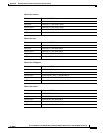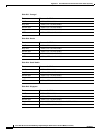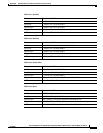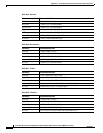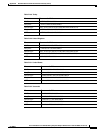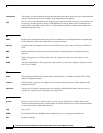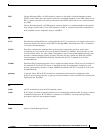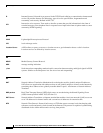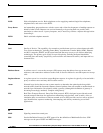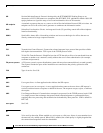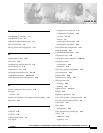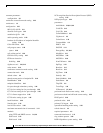
Glossary
GL-3
Cisco ATA 186 and Cisco ATA 188 Analog Telephone Adaptor Administrator’s Guide for MGCP (version 3.0)
OL-4803-01
FXO
Foreign Exchange Office. An FXO interface connects to the public switched telephone network
(PSTN) central office and is the interface offered on a standard telephone. Cisco FXO interface is an
RJ-11 connector that allows an analog connection at the PSTN central office or to a station interface
on a PBX.
FXS
Foreign Exchange Station. An FXS interface connects directly to a standard telephone and supplies
ring, voltage, and dial tone. Cisco's FXS interface is an RJ-11 connector that allows connections to
basic telephone service equipment, keysets, and PBXs.
G
G.711
Describes the 64-kbps PCM voice coding technique. In G.711, encoded voice is already in the correct
format for digital voice delivery in the PSTN or through PBXs. Described in the ITU-T standard in
its G-series recommendations.
G.723.1
Describes a compression technique that can be used for compressing speech or audio signal
components at a very low bit rate as part of the H.324 family of standards. This Codec has two bit
rates associated with it: 5.3 and 6.3 kbps. The higher bit rate is based on ML-MLQ technology and
provides a somewhat higher quality of sound. The lower bit rate is based on CELP and provides
system designers with additional flexibility. Described in the ITU-T standard in its G-series
recommendations.
G.729A
Describes CELP compression where voice is coded into 8-kbps streams. There are two variations of
this standard (G.729 and G.729 Annex A) that differ mainly in computational complexity; both
provide speech quality similar to 32-kbps ADPCM. Described in the ITU-T standard in its G-series
recommendations.
gateway
A gateway allows SIP or H.323 terminals to communicate with terminals configured to other
protocols by converting protocols. A gateway is the point where a circuit-switched call is encoded and
repackaged into IP packets.
H
H.245
An ITU standard that governs H.245 endpoint control.
H.323
H.323 allows dissimilar communication devices to communicate with each other by using a standard
communication protocol. H.323 defines a common set of CODECs, call setup and negotiating
procedures, and basic data transport methods.
I
ICMP
Internet Control Message Protocol



